- Home
- Patricia Cornwell
Cruel & Unusual
Cruel & Unusual Read online
Cruel and Unusual
by Patricia Cornwell
A Kay Scarpetta Mystery
This book is for the inimitable Dr. Marcella Fierro.
(You taught Scarpetta well.)
PROLOGUE (A MEDITATION AT SPRING STREET BY THE Damned)
It is two weeks before Christmas. Four days before nothing at all. I lie on my bed staring at my dirty bare feet and the white toilet missing its seat, and when cockroaches crawl across the floor I don't jump anymore. I watch them the same way they watch me.
I close my eyes and breathe slow.
I remember raking hay in the heat of day and getting no pay compared to the way white folk live. I dream of roasting peanuts in a tin and when the tomatoes are in eating them like apples. I imagine driving the pickup truck, sweat shining on my face in that no-future place I swore I'd leave.
I can't use the john, blow my nose, or smoke without guards taking notes. There's no clock. I never know the weather. I open my eyes and see a blank wall going on forever. What's a man supposed to feel when he's about to be gone? Like a sad, sad song. I don't know the words. I can't remember. They say it happened in September when the sky was like a robins egg and leaves were on fire and falling to the ground. They say a beast got loose in the city. Now there's one less sound.
Killing me won't kill the beast. The dark is his friend, flesh and blood his feast. When you think it's safe to stop looking that's when you'd better start looking, brother.
One leads to another.
Ronnie Joe Waddell
1
The Monday I carried Ronnie Joe Waddells meditation in my pocketbook, I never saw the sun. It was dark out when I drove to work that morning. It was dark again when I drove home: Small raindrops spun in my headlights, the night gloomy with fog and bitterly cold. I built a fire in my living room and envisioned Virginia farmland and tomatoes ripening in the sun. I imagined a young black man in the hot cab of a pickup truck and wondered if his head had been full of murder back then. Waddell's meditation had been published in the Richmond Times-Dispatch and I had taken the clipping to work to add to his growing file. But the business of the day distracted me and his meditation had remained in my pocketbook. I had read it several times. I supposed it would always intrigue me that poetry and cruelty could reside in the same heart.
For the next few hours I paid bills and wrote Christmas cards while the television played mutely. Like the rest of Virginia's citizens, whenever an execution was scheduled I found out from the media whether appeals had been exhausted or the governor had Bran clemency. The news determined whether I went on bed or drove downtown to the morgue.
At almost ten P.M. my telephone rang. I answered it expecting my deputy chief or some other member of my staff whose evening, like mine, was on hold.
“Hello?” asked a male voice I did not recognize. “I' trying to reach Kay Scarpetta? Uh, the chief medic examiner, Dr. Scarpetta?”
“Speaking,” I said.
“Oh, good. Detective Joe Trent with Henrico County. Found your number in the book. Sorry to bother you at home.”
He sounded keyed up. “But we've got a situation we really need your help with.”
“What's the problem?” I asked, staring tensely at the TV. A commercial was playing. I hoped I wasn't needed at a scene.
“Earlier this evening, a thirteen-year-old white male was abducted after leaving a convenience store in Northside. He was shot in the head and there may be some sexual components involved.”
My heart sank as I reached for paper and pen.
“Where is the body?” I asked.
“He was found behind a grocery store on Patter Avenue in the county. I mean, he's not dead. He hasn't regained consciousness but no one's saying right now whether he'll make it. I realize it's not your case since he's not dead. But he's got some injuries that are real odd. They're not like anything I've ever come across. I know you see a lot of different types of injuries. I'm hoping you might have some idea how these were inflicted and why.”
“Describe them for me,” I said.
“We're talking about two areas. One on his inner right thigh, you know, up high near the groin. The other's in the area of his right shoulder. Chunks of flesh are missing - cut out. And there's weird cuts and scratches around the edges of the wounds. He's at Henrico Doctor's.”
“Did you find the excised tissue?”
My mind was racing through other cases, looking for something similar.
“Not so far. We've got men out there still searching. But it's possible the assault occurred inside a car.”
“Whose car?”
“The assailant's. The grocery store parking lot where the kid was found is a good three or four miles from the convenience store where he was last seen. I'm thinking he got into somebody's car, maybe was forced to.”
“You got photographs of the injuries before the doctors started working on him?”
“Yes. But they haven't done much. Because of the amount of skin missing, they'll have to do skin grafts full grafts, is what they said, if that tells you anything.”
It told me they had debrided the wounds, had him on intravenous antibiotics, and were waiting to do a gluteal graft. If, however, that was not the case and they had undermined the tissue around the injuries and sutured them, then there wasn't going to be much left for me to see.
“They haven't sutured his wounds,” I said.
'That's what I've been told.'
“Do you want me to take a look?”
“That would be really great,” he said, relieved. “You should be able to see the wounds real well.”
“When would you like me to do this?”
“Tomorrow would work.”
“All right. What time? The earlier the better.”
“Eight hundred hours? I'll meet you in front of the ER.”
“I'll be there,” I said as the anchorman stared grimly at me. Hanging up, I reached for the remote control and turned up the sound.
“. . . Eugenia? Can you tell us if there's been any word from the governor?”
The camera shifted to the Virginia State Penitentiary, where for two hundred years the Commonwealth's worst criminals had been warehoused along a rocky stretch of the James River at the edge of downtown. Sign-carrying protesters and capital punishment enthusiasts gathered in the dark, their faces harsh in the glare of television lights. It chilled my soul that some people were laughing.
A pretty, young correspondent in a red coat filled the screen “As you know, Bill,” she said, “yesterday a telephone line was set up between Governor Norring's office and the penitentiary. Still no word, and that speaks volumes. Historically, when the governor doesn't intend to intervene, he remains silent.”
“How are things there? Is it relatively peaceful so far?”
“So far, yes, Bill. I'd say several hundred people are standing vigil out here. And of course, the penitentiary itself is almost empty. All but several dozen of the inmates have already been transported to the new correctional facility in Greensville.”
I turned off the TV and moments later was driving east with my doors locked and the radio on. Fatigue seeped through me like anesthesia. I felt dreary and numb. I dreaded executions. I dreaded waiting for someone to die, then running my scalpel through flesh as warm as mine. I was a physician with a law degree. I had been trained to know what gave life and what took it, what was right and what was wrong. Then experience had become my mentor, wiping its feet on that pristine part of myself that was idealistic and analytical. It is disheartening when a thinking person is forced to admit that many cliches are true. There is no justice on this earth. Nothing would ever undo what Ronnie Joe Waddell had done.
He had been on death row nine years. His victim h
ad not been my case because she had been murdered before I had been appointed chief medical examiner of Virginia and had moved to Richmond. But I had reviewed her records. I was well aware of every savage detail. On the morning of September fourth, ten years before, Robyn Naismith called in sick at Channel 8, where she was an anchorwoman. She went out to buy cold remedies and returned home. The next day, her nude, battered body was found in her living room, propped against the TV. A bloody thumbprint recovered from the medicine cabinet was later identified as Bonnie Joe Waddell's.
There were a number of cars parked behind the morgue when I pulled in. My deputy chief, Fielding, was already there. So was my administrator, Ben Stevens, and morgue supervisor, Susan Story. The bay door was open, lights inside dimly illuminating the tarmac beyond, and a capitol police officer was sitting in his marked car smoking. He got out as I parked.
“Safe to keep the bay door open?” I asked. He was a tall, gaunt man with thick white hair. Though I had talked to him many times in the past, I couldn't remember his name.
“Appears okay at the moment, Dr. Scarpetta,” he said, zipping up his heavy nylon jacket. “I haven't seen any troublemakers around. But as soon as Corrections gets here I'll close it and make sure it stays closed.”
“Fine. As long as you'll be right here in the meantime.”
“Yes, ma'am. You can count on that. And we'll have a couple more uniform men back here in case there's a problem. Apparently there's a lot of protesters. I guess you read in the paper about that petition all those people signed and took to the governor. And I heard earlier today some bleeding hearts as far away as California are on a hunger strike.”
I glanced around the empty parking lot and across Main Street. A car rushed past, tires swishing over wet pavement. Streetlights were smudges in the fog.
“Hell, not me. I wouldn't even miss a coffee break for Waddell.”
The officer cupped his hand around his lighter and began puffing on a cigarette. “After what he done to that Naismith girl. You know, I remember watching her on TV. Now, I like my women the same way I like my coffee - sweet and white. But I have to admit, she was the prettiest black girl I ever seen.”
I had quit smoking barely two months ago, and it still made me crazy to watch someone else doing it.
“Lord, that must've been dose to ten years ago,” he went on. “I'll never forget the uproar, though. One of the worst cases we've ever had around here. You'd've thought a grizzly bear got hold of -” I interrupted him. “You'll let us know what's going on?”
“Yes, ma'am. They'll radio me and I'll give you the word.”
He headed back to the shelter of his car. Inside the morgue, fluorescent light bleached the corridor of color, the smell of deodorizer cloying. I passed the small office where funeral homes signed in bodies, then the X-ray room, and the refrigerator, which was really a large refrigerated room with doubledecker gurneys and two massive steel doors. The autopsy suite was lit up, stainless steel tables polished bright. Susan was sharpening a long knife and Fielding was labeling blood tubes. Both of them looked as tired and unenthusiastic as I felt.
“Ben's upstairs in the library watching TV,” Fielding said to me. “He'll let us know if there are any new developments.”
“What's the chance this guy had AIDS?” Susan referred to Waddell as if he already were dead.
“I don't know,” I said. “We'll double-glove, take the usual precautions.”
“I hope they'll say something if he had it,” she persisted. “You know, I don't trust it when they send these prisoners in. I don't think they care if they're HIV positive because it's not their problem. They're not the ones doing the posts and worrying about needle sticks.”
Susan had become increasingly paranoid about such occupational hazards as exposure to radiation, chemicals, and diseases. I could not blame her. She was several months pregnant, though it barely showed.
Slipping on a plastic apron, I went back into the locker room and put on greens, covered my shoes with booties, and got two packets of gloves. I inspected the surgical cart parked beside table three. Everything was labeled with Waddell's name, the date, and an autopsy number. The labeled tubes and cartons would go in the trash if Governor Norring interceded at the last minute. Ronnie Waddell would be deleted from the morgue log, his autopsy number assigned to whoever came in next.
At eleven P.M. Ben Stevens came downstairs and shook his head. All of us looked up at the clock. No one spoke. Minutes ticked by.
The capitol police officer walked in, portable radio in hand. I finally remembered his name was Rankin.
“He was pronounced at eleven-oh-five,” he said. “Will be here in about fifteen minutes.”
The ambulance beeped a warning as it backed into the bay, and when its rear doors swung open, enough Department of Corrections guards hopped out to control a small prison riot. Four of them slid out the stretcher bearing Ronnie Waddell's body. They carried it up the ramp and inside the morgue, metal clacking, feet scuffing, all of us getting out of the way. Lowering the stretcher to the tile floor without bothering to unfold the legs, they propelled it along like a sled on wheels, its passenger strapped in and covered with a bloodstained sheet.
“A nosebleed,” one of the guards offered before I could ask the question.
“Who had a nosebleed?” I inquired, noting that the guard's gloved hands were bloody.
“Mr. Waddell did.”
“In the ambulance?”
I puzzled, for Waddell should not have had a blood pressure by the time he was loaded inside the ambulance.
But the guard was preoccupied with other matters and I did not get an answer. It would have to wait.
We transferred the body to the gurney positioned on top of the floor scale. Busy hands fumbled with unfastening straps and opening the sheet. The door to the autopsy suite quietly shut as the Department of Corrections guards left just as abruptly as they had appeared.
Waddell had been dead exactly twenty-two minutes. I could smell his sweat, his dirty bare feet, and the faint odor of singed flesh. His right pant leg was pushed up above his knee, his calf dressed in fresh gauze applied postmortem to his burns. He was a big, powerful man. The newspapers had called him the gentle giant, poetic Ronnie with soulful eyes. Yet there had been a time when he had used the large hands, the massive shoulders and arms before me to rip the life from another human being.
I pulled apart the Velcro fasteners of his light blue denim shirt, checking pockets as I undressed him. Searching for personal effects is pro forma and usually fruitless. Inmates are not supposed to carry anything with them to the electric chair, and I was very surprised when I discovered what appeared to be a letter in the back pocket of his jeans. The envelope had not been opened. Written in bold block letters across the front of it was EXTREMELY CONFIDENTIAL. PLEASE BURY WITH ME!! “Make a copy of the envelope and whatever's inside and submit the originals with his personal effects,” I said, handing the envelope to Fielding.
He tucked it under the autopsy protocol on a clipboard, mumbling, 'Jesus. He's bigger than I am.”
“Amazing that anyone mold be bigger than you are, “ Susan said to my bodybuilder deputy chief.
“Good thing he's not been dead long,” he added. “Otherwise we'd need the jaws of Life.”
When muscle-bound people have been dead for hours, they are as uncooperative as marble statues. Rigor had not begun to set in. Waddell was limber as in life. He could have been asleep.
It required all of us to transfer him, facedown, to the autopsy table. He weighed two hundred and fifty-nine pounds. His feet protruded over the table's edge. I was measuring the burns to his leg when the buzzer sounded from the bay. Susan went to see who it was, and shortly Lieutenant Pete Marino walked in, trench coat unbuttoned, one end of the belt trailing along the tile floor.
“The burn to the back of his calf is four by one and a quarter by two and three-eighths,” I dictated to Fielding. “It's dry, contracted, and blistered.”
“His rectal temp is one hundred and four,” Susan said as she removed the chemical thermometer. “That's at eleven-forty-nine.”
“You know why his face was bleeding?” Marino asked.
“One of the guards said a nosebleed,” I replied, adding, “We need to turn him over.”
“You saw this on the inner aspect of his left arm?” Susan directed my attention to an abrasion.
I examined it through a lens under a strong light. “I don't know. Possibly from one of the restraints: “ “There's one on his right arm, too.”
I took a look while Marino watched me and smoked. We turned the body, shoving a block under the shoulders. Blood trickled out of the right side of his nose. His head and chin had been shaved to an uneven stubble. I made the Y incision.

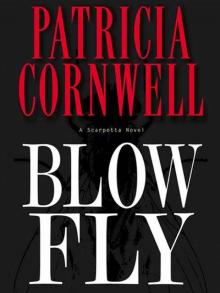 Blow Fly
Blow Fly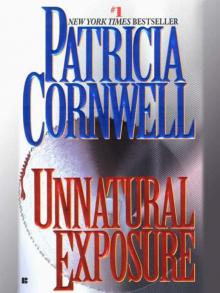 Unnatural Exposure
Unnatural Exposure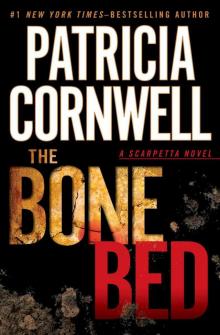 The Bone Bed
The Bone Bed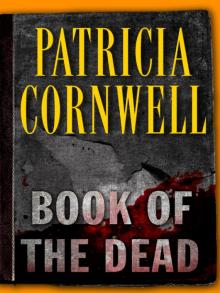 Book of the Dead
Book of the Dead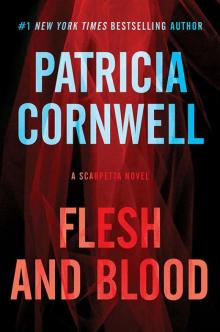 Flesh and Blood: A Scarpetta Novel (Scarpetta Novels Book 22)
Flesh and Blood: A Scarpetta Novel (Scarpetta Novels Book 22)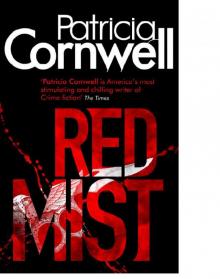 Red Mist
Red Mist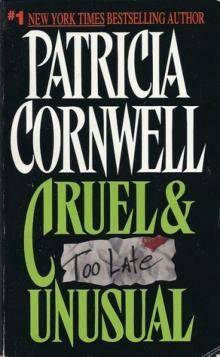 Cruel & Unusual
Cruel & Unusual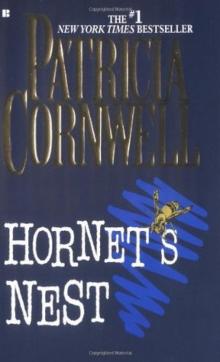 Hornet's Nest
Hornet's Nest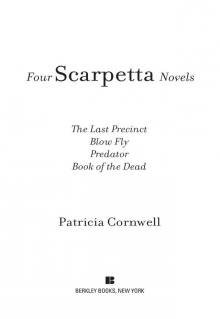 Four Scarpetta Novels
Four Scarpetta Novels Scarpetta's Winter Table
Scarpetta's Winter Table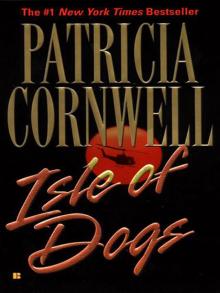 Isle of Dogs
Isle of Dogs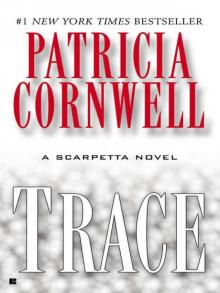 Trace
Trace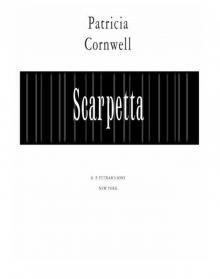 Postmortem
Postmortem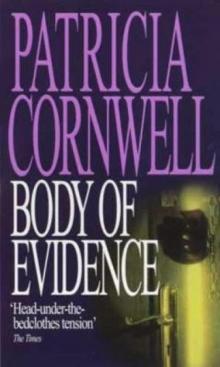 Body of Evidence ks-2
Body of Evidence ks-2 Southern Cross
Southern Cross All That Remains
All That Remains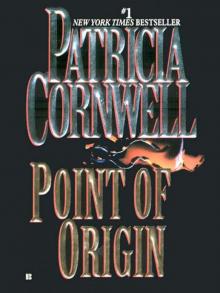 Point of Origin
Point of Origin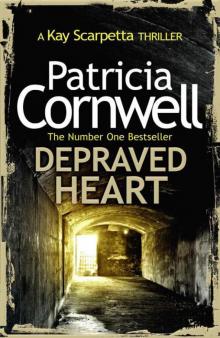 Depraved Heart
Depraved Heart Ruth, a Portrait: The Story of Ruth Bell Graham
Ruth, a Portrait: The Story of Ruth Bell Graham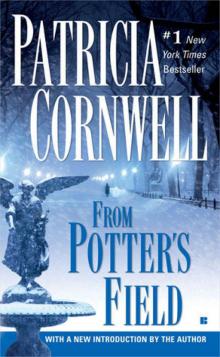 From Potter's Field
From Potter's Field Flesh and Blood
Flesh and Blood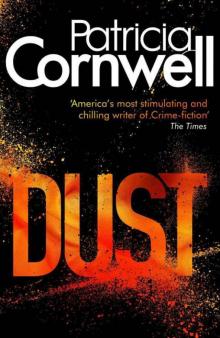 Dust
Dust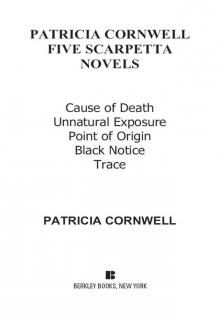 The Body Farm
The Body Farm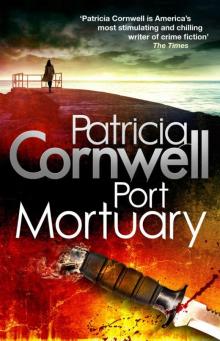 Port Mortuary
Port Mortuary Quantum
Quantum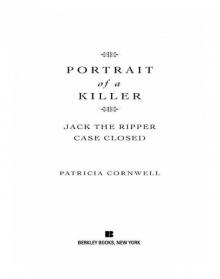 Portrait of a Killer: Jack the Ripper - Case Closed
Portrait of a Killer: Jack the Ripper - Case Closed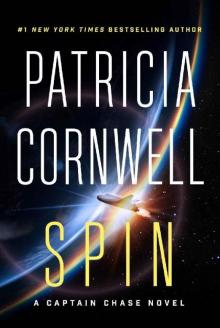 Spin (Captain Chase)
Spin (Captain Chase)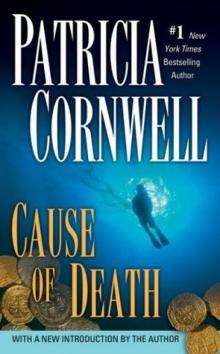 Cause of Death
Cause of Death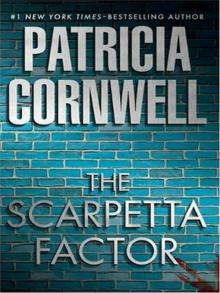 The Scarpetta Factor
The Scarpetta Factor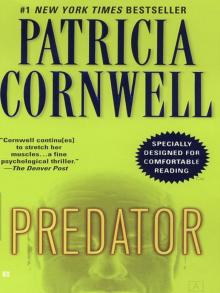 Predator
Predator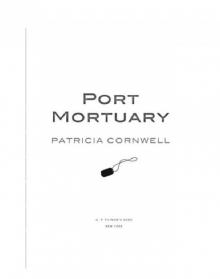 Scarpetta 18 - Port Mortuary
Scarpetta 18 - Port Mortuary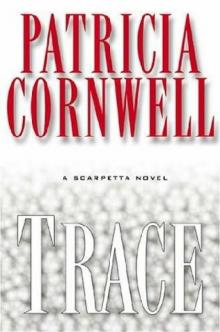 Trace ks-13
Trace ks-13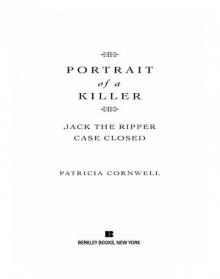 Portrait of a Killer
Portrait of a Killer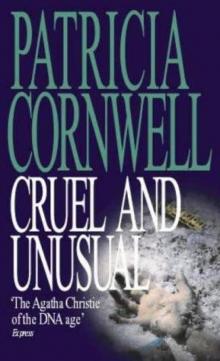 Cruel and Unusual ks-4
Cruel and Unusual ks-4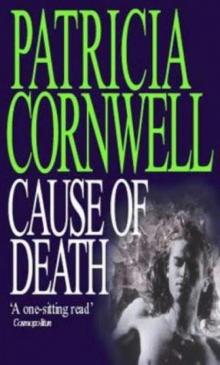 Cause Of Death ks-7
Cause Of Death ks-7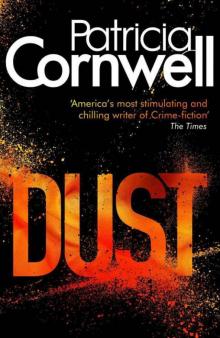 Dust ks-21
Dust ks-21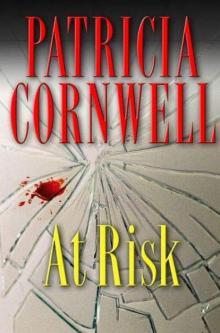 At Risk wg-1
At Risk wg-1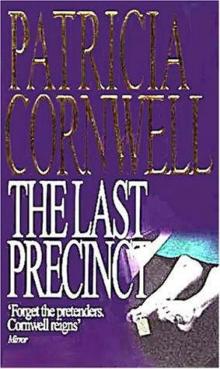 The Last Precinct ks-11
The Last Precinct ks-11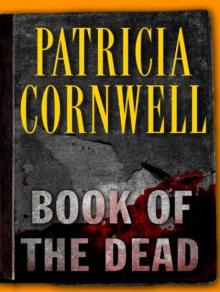 Book of the Dead ks-15
Book of the Dead ks-15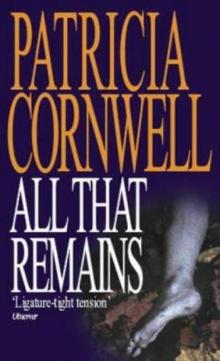 All That Remains ks-3
All That Remains ks-3 Ruth, a Portrait
Ruth, a Portrait Scarpetta's Winter Table (kay scarpetta)
Scarpetta's Winter Table (kay scarpetta)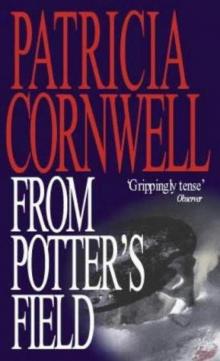 From Potter's Field ks-6
From Potter's Field ks-6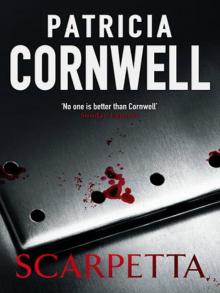 Scarpetta
Scarpetta Isle of Dogs jhabavw-3
Isle of Dogs jhabavw-3 Hornet's Nest jhabavw-1
Hornet's Nest jhabavw-1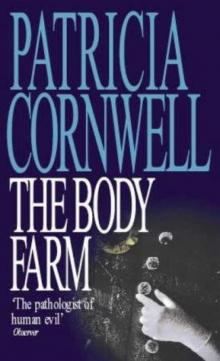 The Body Farm ks-5
The Body Farm ks-5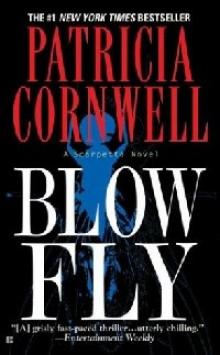 Blow Fly ks-12
Blow Fly ks-12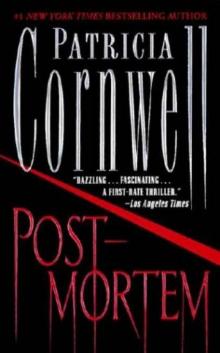 Post Mortem
Post Mortem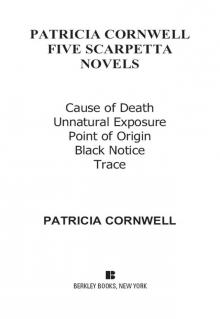 Five Scarpetta Novels
Five Scarpetta Novels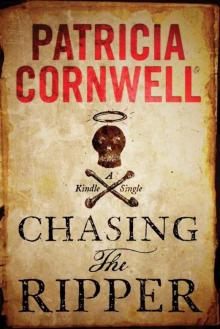 Chasing the Ripper (Kindle Single)
Chasing the Ripper (Kindle Single)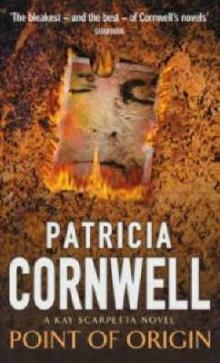 Point of Origin ks-9
Point of Origin ks-9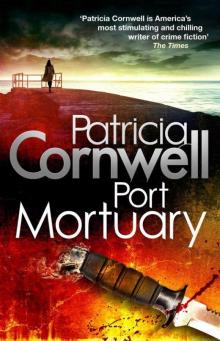 Port Mortuary (2010)
Port Mortuary (2010)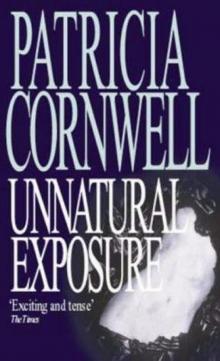 Unnatural Exposure ks-8
Unnatural Exposure ks-8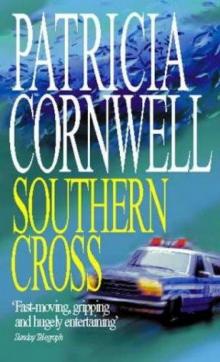 Southern Cross uhabavw-2
Southern Cross uhabavw-2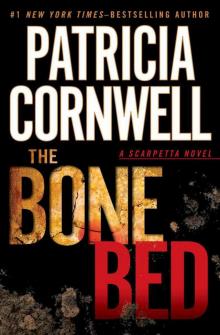 The Bone Bed ks-20
The Bone Bed ks-20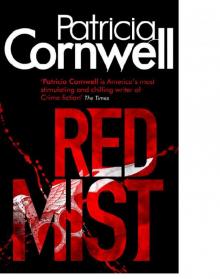 Red Mist ks-19
Red Mist ks-19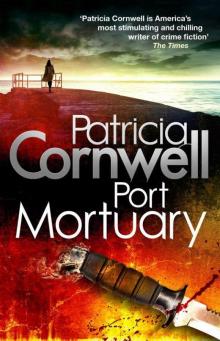 Port Mortuary (2010) ks-18
Port Mortuary (2010) ks-18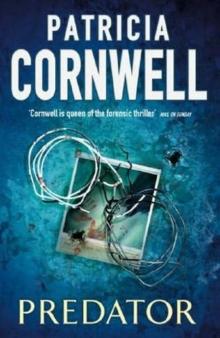 Predator ks-14
Predator ks-14